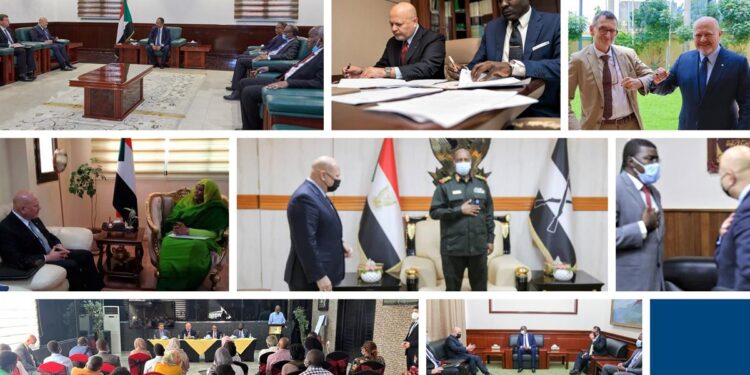By Janet Sankale
The International Criminal Court (ICC) will soon deploy a team to Khartoum to gather more evidence to help build a solid case against the suspects in the Sudan situation.
This is one of the positive results of Prosecutor Karim Khan’s visit to Sudan that concluded last week with a firm promise of cooperation from the government in Khartoum.
Khan’s week-long visit culminated in the signing of a memorandum of understanding with the Transitional Government of Sudan to provide a basis of cooperation and exchange of information in relation to the individuals against whom the ICC has issued arrest warrants.
“Sudan is not alone and my office is dedicated inshallah to the best of our ability to reach out and cooperate, and work with the Government of Sudan and her institutions,” the Prosecutor said in a press statement issued on Thursday, August 12, 2021 via the Sudan News Agency (SUNA). He also commended members of the transitional government for welcoming and cooperating with his team.
At a press conference in Khartoum, Khan said that although his discussions with the Sudanese authorities included the ICC’s request for the extradition of suspects, including former President Omar Al Bashir, no firm dates had been set.
“Transfer of any suspect is an important step towards achieving justice but should be preceded and accompanied by substantive and ever-deepening cooperation by the Sudanese authorities,” he explained in his statement, adding that he had requested the authorities to provide immediate and full access to evidence pertinent to his office’s investigations in the situation.
Khan, whose visit to Sudan comes shortly after he assumed office as ICC Prosecutor last June, announced that he planned to visit Darfur in November this year.
He said his visit was motivated by various factors, including the nature of the alleged crimes, the rights of the survivors, and the fact that this is the first situation referred by the United Nations Security Council to the ICC.
The Prosecutor held talks with high-ranking Sudanese government officials, including General Abdel Fattah Abdelrahman al-Burhan, the Chairman of the ruling Transitional Sovereignty Council (TSC), Prime Minister Abdalla Hamdok, Acting Attorney General Mubarak Mohammad Osman, and other members of the TSC; members of the diplomatic corps; and representatives of civil society organisations.
The visit came just a week after the Sudanese cabinet approved a bill that set the country on the path to becoming a member of the Assembly of States Parties of the ICC by ratifying the Rome Statute.
Violence broke out in Darfur in 2003 when rebels protested what they contended was the Sudanese government’s disregard for the Western region and its non-Arab population.
The government, under the leadership of Bashir, responded by equipping and supporting Arab militias – which came to be known as the Janjaweed – to fight the insurrection in Darfur. The militias also terrorised civilians and prevented international aid organisations from delivering much-needed food and medical supplies to the region.
The United Nations says that about 300,000 people were killed and 2.5 million more displaced during the conflict that lasted between February 2003 and 2009.
Bashir has been accused of orchestrating genocide, crimes against humanity, and war crimes in Darfur. The ICC issued warrants of arrest against him on March 4, 2009, and July 12, 2010. He was removed from office in April 2019 and has been in Sudanese custody pending his transfer to the ICC, where his case remains at the pre-trial stage.
Since the overthrow of Bashir’s leadership, a joint military-civilian government has led Sudan. The transitional government has so far shown willingness to cooperate with the ICC and promised to hand over Bashir to stand trial.
The trial against former Janjaweed commander Ali Muhammad Ali Abd-Al-Rahman has yet to start but charges have been confirmed and judges appointed. Abd-Al-Rahman is facing 31 counts of war crimes and crimes against humanity during the Darfur conflict. Khan applauded the Sudanese government for providing information in the case against Abd-Al-Rahman.
The ICC also issued arrest warrants against Ahmad Harun, Abdel Raheem Muhammad Hussein, Muhammad Hussein Abdallah Banda Abakaer Nourain (Abdallah Banda), and Bahar Idriss Abu Garda.
Harun, Nourain, and Hussein are still at large. The Pre-Trial Chamber declined to confirm the charges against Garda and the case is considered closed until or unless the Prosecutor presents new evidence.







